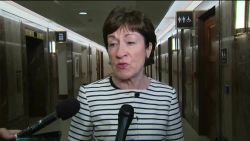It’s easy – and obvious – to focus on the high-profile ways in which Donald Trump is remaking American government and, by extension, American culture: His appointment of Neil Gorsuch to the Supreme Court, his tax cut plan, his tweeting – to name three.
And, those things clearly matter. Gorsuch will be on the nation’s highest court for life. The tax plan, which Republicans are expected to pass through both chambers of Congress this week, will fundamentally alter the nation’s tax structure. Trump’s tweeting – and retweeting – is changing the way in which a president interacts with the country and the words and images he uses to do it.
But, we know about all of those changes because they are right in front of our faces. What we know far less about – but are no less important in the structural reshaping of the federal bureaucracy and the populace more broadly – is how Trumpism is being felt in the myriad federal agencies that are simply not on the national radar.
Take, for example, the reporting by the Washington Post over the weekend that the Centers for Disease Control have been warned not to use 7 hot-button words in future budget proposals. The banned words, you ask? “Diversity,” “fetus,” “transgender,” “vulnerable,” “entitlement,” “science-based” and “evidence-based.”
The Department of Health and Human Services insisted there was no “banned words” list, with spokesman Matt Lloyd adding: “HHS will continue to use the best scientific evidence available to improve the health of all Americans. HHS also strongly encourages the use of outcome and evidence data in program evaluations and budget decisions.”
Of course, denying that there is a “banned words” list is far different from denying that recommendations have been given about what exact words to use when making budget proposals – proposals that secure the funding to keep research and programs alive (or not).
Given the stakes – broad-scale research projects live or die based on funding decisions like these – the words-to-avoid warning has a decided chilling effect.
Put yourself in the shoes of a scientists trying to secure funding for a project. If you knew – or had heard whispers – that bigwigs up the food chain didn’t want certain words in your budget proposal, what would you do? Most people would avoid using those words and write it off as the cost of doing business.
And, that’s mission accomplished for the people who are trying to edit out what they view to be loaded words from the bureaucratic lexicon. Words have power. And being able to hold funding off – or let the perception you are willing to withhold funding – because someone used words you don’t approve of is a very scary thing.
The Centers for Disease Control and Prevention word warning is part of the broader pattern of behavior we’ve seen in the first 11 months of the Trump administration. The unwillingness to acknowledge a shared set of facts, the persistent falsehoods from the President on down, the relentless attacks on the news media for alleged bias – all of those things are part and parcel with this sort of move at the CDC.
Trump has set the example from the top: You are only limited in how far you can push the envelope by how far you are willing to push the envelope. There are no rules anymore except the rules you create for yourself. Truth is in the eye of the beholder – and anyone the beholder can convince. You take as much as you can take – until you run into someone who can stop you from taking anymore.
What’s most frightening is that unless CDC officials had alerted the Post to this story, no one outside of that organization might have ever heard about it. Which means that there are other incidents just like the one at the CDC that have happened, are happening and will happen that we are likely to never know about – or know about only in the light of history.
That, as much as the tax plan or Gorsuch, will be the lasting legacy of Donald Trump’s presidency. The boundary-pushing that sits at the core of Trumpism is far more impactful in places that don’t get much (or any) scrutiny. It’s in those places where the changes being implemented – often entirely away from public scrutiny – will be felt most deeply in the coming years and decades.




















